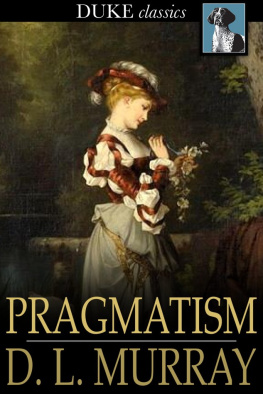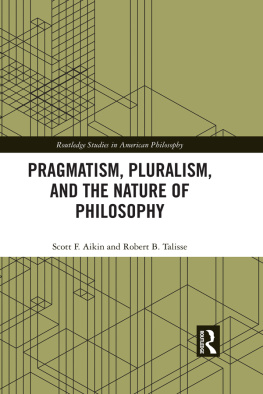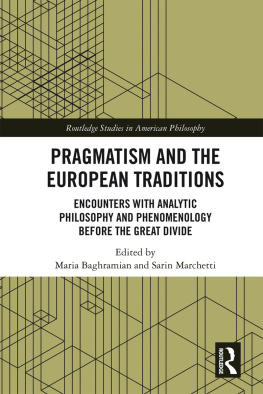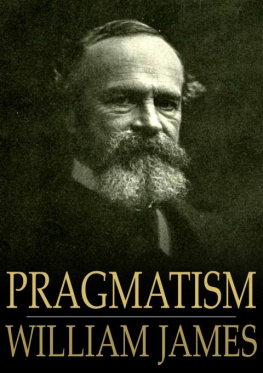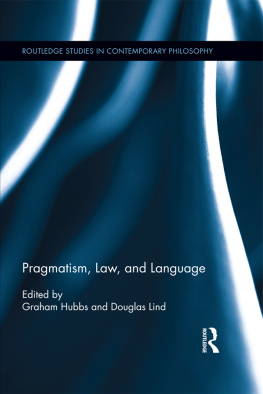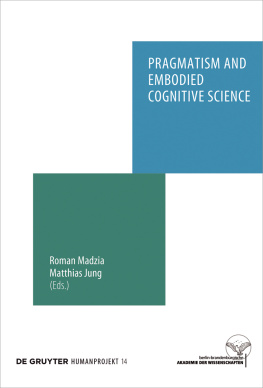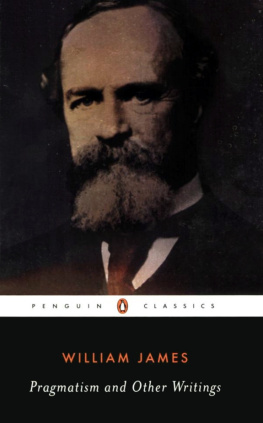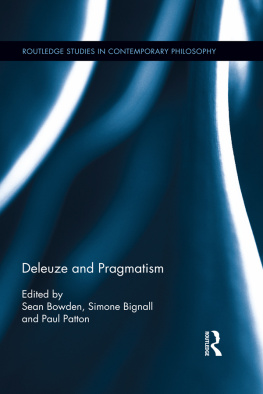D. L. Murray - Pragmatism
Here you can read online D. L. Murray - Pragmatism full text of the book (entire story) in english for free. Download pdf and epub, get meaning, cover and reviews about this ebook. year: 2014, publisher: Duke Classics, genre: Religion. Description of the work, (preface) as well as reviews are available. Best literature library LitArk.com created for fans of good reading and offers a wide selection of genres:
Romance novel
Science fiction
Adventure
Detective
Science
History
Home and family
Prose
Art
Politics
Computer
Non-fiction
Religion
Business
Children
Humor
Choose a favorite category and find really read worthwhile books. Enjoy immersion in the world of imagination, feel the emotions of the characters or learn something new for yourself, make an fascinating discovery.
- Book:Pragmatism
- Author:
- Publisher:Duke Classics
- Genre:
- Year:2014
- Rating:5 / 5
- Favourites:Add to favourites
- Your mark:
- 100
- 1
- 2
- 3
- 4
- 5
Pragmatism: summary, description and annotation
We offer to read an annotation, description, summary or preface (depends on what the author of the book "Pragmatism" wrote himself). If you haven't found the necessary information about the book — write in the comments, we will try to find it.
The philosophical school of thought known as pragmatism focuses on the mind and thoughts as tools for rational decision-making. This concept proved to be enormously influential throughout the twentieth century. In this concise volume, Murray presents a thorough discussion of pragmatism and the ideas underpinning it.
Pragmatism — read online for free the complete book (whole text) full work
Below is the text of the book, divided by pages. System saving the place of the last page read, allows you to conveniently read the book "Pragmatism" online for free, without having to search again every time where you left off. Put a bookmark, and you can go to the page where you finished reading at any time.
Font size:
Interval:
Bookmark:

First published in 1912
ISBN 978-1-63421-228-1
Duke Classics
2014 Duke Classics and its licensors. All rights reserved.
While every effort has been used to ensure the accuracy and reliability of the information contained in this edition, Duke Classics does not assume liability or responsibility for any errors or omissions in this book. Duke Classics does not accept responsibility for loss suffered as a result of reliance upon the accuracy or currency of information contained in this book.
Mr. Murray's youthful modesty insists that his study of Pragmatism needsa sponsor; this is not at all my own opinion, but I may take theopportunity of pointing out how singularly qualified he is to give agood account of it.
In the first place he is young, and youth is an almost indispensablequalification for the appreciation of novelty; for the mind works moreand more stiffly as it grows older, and becomes less and less capable ofabsorbing what is new. Hence, if our 'great authorities' lived for ever,they would become complete Struldbrugs. This is the justification ofdeath from the standpoint of social progress. And as there is no subjectin which Struldbruggery is more rampant than in philosophy, a youthfuland nimble mind is here particularly needed. It has given Mr. Murray aneye also to the varieties of Pragmatism and to their connections.
Secondly, Mr. Murray has (like myself) enjoyed the advantage of aseverely intellectualistic training in the classical philosophy ofOxford University, and in its premier college, Balliol. The aim of thistraining is to instil into the best minds the country produces anadamantine conviction that philosophy has made no progress sinceAristotle. It costs about 50,000 a year, but on the whole it issingularly successful. Its effect upon capable minds possessed of commonsense is to produce that contempt for pure intellect which distinguishesthe British nation from all others, and ensures the practical success ofadministrators selected by an examination so gloriously irrelevant totheir future duties that, since the lamentable demise of the Chinesesystem, it may boast to be the most antiquated in the world. In minds,however, which are more prone to theorizing, but at the same timeclear-headed, this training produces a keenness of insight into thedefects of intellectualism and a perception of the intellectualnecessity of Pragmatism which can probably be reached in no other way.Mr. Murray, therefore, is quite right in emphasizing, above all, theservices of Pragmatism as a rigorously critical theory of knowledge, andin refuting the amiable delusion of many pedants that Pragmatism ismerely an emotional revolt against the rigors of Logic. It isessentially a reform of Logic, which protests against a Logic that hasbecome so formal as to abstract from meaning altogether.
Thirdly, an elementary introduction to Pragmatism was greatly needed,less because the subject is inherently difficult than because it hasbecome so deeply involved in philosophic controversy. Intrinsically itshould be as easy to make philosophy intelligible as any other subject.The exposition of a truth is difficult only to those who have notunderstood it, or do not desire to reveal it. But British philosophy hadlong become almost as open as German to the (German) gibe that'philosophy is nothing but the systematic misuse of a terminologyinvented expressly for this purpose,' and Pragmatism, too, could obtaina hearing only by showing that it could parley with its foes in thetechnical language of Kant and Hegel.
Hence it had no leisure to compose a fitting introduction to itself forstudents of philosophy. William James's Pragmatism, great as it is asa work of genius, brilliant as it is as a contribution to literature,was intended mainly for the man in the street. It is so lacking in thefamiliar philosophic catchwords that it may be doubted whether anyprofessor has quite understood it. And moreover, it was written someyears ago, and no longer covers the whole ground. The other writings ofthe pragmatists have all been too controversial and technical.
The critics of Pragmatism have produced only caricatures so gross as tobe unrecognizable, and so obscure as to be unintelligible. Mr. Murray'slittle book alone may claim to be (within its limits) a complete surveyof the field, simply worded, and yet not unmindful of due technicality.It is also up to date, though in dealing with so progressive a subjectit is impossible to say how long it is destined to remain so.
F. C. S. SCHILLER.
There is a curious impression to-day in the world of thought thatPragmatism is the most audacious of philosophic novelties, the mostanarchical transvaluation of all respectable traditions. Sometimes it ispictured as an insurgence of emotion against logic, sometimes as anassault of theology upon the integrity of Pure Reason. One day it isdescribed as the reckless theorizing of dilettanti whose knowledge ofphilosophy is too superficial to require refutation, the next as atransatlantic importation of the debasing slang of the Wild West. Abroadit is frequently denounced as an outbreak of the sordid commercialism ofthe Anglo-Saxon mind.
All these ideas are mistaken. Pragmatism is neither a revolt againstphilosophy nor a revolution in philosophy, except in so far as it is animportant evolution of philosophy. It is a collective name for the mostmodern solution of puzzles which have impeded philosophical progressfrom time immemorial, and it has arisen naturally in the course ofphilosophical reflection. It answers the big problems which are asfamiliar to the scientist and the theologian as to the metaphysician andepistemologist, and which are both intelligible and interesting tocommon sense.
The following questions stand out: (1) Can the possibility of knowledgebe maintained against Hume and other sceptics? Certainly, if it can beshown that 'The New Psychology' has antiquated the analysis of mindwhich Hume assumed and 'British Associationism' respectfully continuedto uphold. (2) Seeing that inclination and volition indisputably play apart in the acceptance of all beliefs, scientific and religious, whatis the logical significance of this fact? This yields the problem 'TheWill to Believe,' and more generally of 'the place of Will incognition.' (3) Is there no criterion by which the divergent claims ofrival creeds and philosophiesto be possessed of unconditionaltruthcan be scientifically tested? The sceptic's sneer, that theshifting systems of philosophy illustrate only the changing fashions ofa great illusion about man's capacity for truth, plunges dogmatism intoa 'Dilemma,' from which it can emerge only by finding a way ofdiscriminating a 'truth' from an 'error,' and so solving the 'problem ofTruth and Error.' The weird verbalism of the traditional Logic suggestsa problem which strikes deeper even than the question, 'What do youmean by truth?' viz.: 'Do you mean anything?' and so the 'problem ofMeaning' is propounded by the failure of Formal Logic. Is Logic notconcerned at all with meaning, is it only juggling with empty forms ofwords? Lastly, if from all this there springs up a conviction of 'TheBankruptcy of Intellectualism,' the question suggests itself whether therelation between abstract thinking and concrete experience, between'Thought' and 'Life,' has been rightly grasped. Is life worth livingonly for the sake of philosophic contemplation, or is thinking onlyworth doing to aid us in the struggle for life? Are 'theory' and'practice' two separate kingdoms with rigid frontiers, strictly guarded,or does it appear that theories which cannot be applied have, in theend, neither worth, nor truth, nor even meaning?
Font size:
Interval:
Bookmark:
Similar books «Pragmatism»
Look at similar books to Pragmatism. We have selected literature similar in name and meaning in the hope of providing readers with more options to find new, interesting, not yet read works.
Discussion, reviews of the book Pragmatism and just readers' own opinions. Leave your comments, write what you think about the work, its meaning or the main characters. Specify what exactly you liked and what you didn't like, and why you think so.

